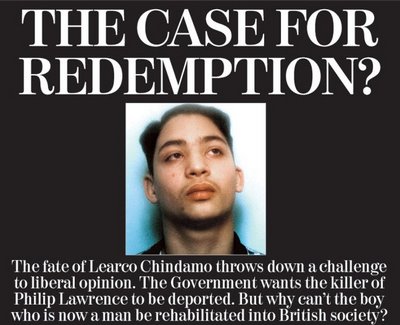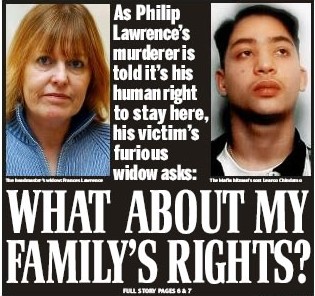Rehabilitation can never win against the demands for a pound of flesh.
 Just how wrong were the original reports about the reasons for why Learco Chindamo couldn't be deported then? Despite nearly every news organisation blaming the decision almost instantly on the Human Rights Act, from the BBC to the Guardian, from the Mail to the Sun, the actual decision was taken not under Article 8 of the HRA, as we were told, but rather on the 2004 EU directive on citizenship, which gives those who have spent over 10 years in one nation state protection from summary deportation to another. It was only if this directive had not applied in Chindamo's case that Article 8 could then then have come into play; as such, it was a secondary factor in the Asylum and Immigration Tribunal's ruling that he should stay in Britain.
Just how wrong were the original reports about the reasons for why Learco Chindamo couldn't be deported then? Despite nearly every news organisation blaming the decision almost instantly on the Human Rights Act, from the BBC to the Guardian, from the Mail to the Sun, the actual decision was taken not under Article 8 of the HRA, as we were told, but rather on the 2004 EU directive on citizenship, which gives those who have spent over 10 years in one nation state protection from summary deportation to another. It was only if this directive had not applied in Chindamo's case that Article 8 could then then have come into play; as such, it was a secondary factor in the Asylum and Immigration Tribunal's ruling that he should stay in Britain.Not that this has stopped even the Times from splashing on the "threat" posed by Chindamo. This supposed threat, taken from the Home Office's submission to the panel on why Chindamo should be deported, was so far from being conclusive, as well as downright disengenuous, that the panel rightly dismissed it. The relevant part of the letter is reproduced by Unity, and ought to be compared to the coverage in the Times, Sun and Mail:
In the revised reasons for deportation letter it is noted that it is unlikely that the appellant will reoffend, and that he accepts his responsibility for his offences and has undertaken courses for anger management. It notes however that his current behaviour and actions and day-to-day life are very closely monitored. There is reference there to one escorted visit, though we accept that the evidence is in fact that he has been on two escorted visits and three unescorted visits. The point is also made in the refusal letter that the court has deemed that the appellant’s crime is of such severity that he will always continue to be a threat to the community such that his release on licence would be on the basis that he might be recalled to prison at any moment for any breach of his conditions. The point is made that he has been assessed and that he is subject to the highest level of multi-agency public protection arrangements (Mappa) (Level 3). In this regard though we must bear in mind the point to which we were referred by Mr Scannell that that assessment was not made on account of the appellant being a threat to the public but because of the likelihood of media scrutiny and/or public interest. The letter does note that risk factors might increase because of media and public scrutiny that the appellant might receive. It also comments that the OAsys report notes that there are occasions where the appellant has overacted to situations and there are severe concerns with finding him appropriate accommodation on release if allowed to remain in the United Kingdom. He would need to be excluded from certain parts of the country, community integration would be a problem on release and he might suffer a backlash. The letter states that the appellant’s notoriety might make him feel excluded from society as he had been before and there was a significant risk that his previous disregard for authority and the law might resurface and result in him coming to adverse attention. As a consequence it was considered that he posed a continuing risk to the public and that his offences were so serious that he represents a genuine and present and sufficiently serious threat to the public in principle such as to justify his deportation.
In other words, the only justification that the Home Office could come up with for his deportation was that because of the adverse press coverage likely around his time of release, it'd be better for him if he was removed from the country entirely. Never mind that he was no longer considered a threat, that he had completed anger management courses, as well as 3 GCSEs and a NVQ, despite not being able to write his address when he entered prison, and that he had shown genuine remorse for his crime, all of that was secondary to the government's concern that it was likely to get it in the neck whether he was deported or not. Their last laughable argument was that he had overreacted on a couple of occasions to certain situations. I think all of us might overreact if we too had been kept in the constant uncertainty and insecurity of prison for twelve years.
What the Times additionally doesn't mention, for reasons to be explained shortly, was that the governor of Ford open prison had made a submission for the tribunal to be held behind closed doors because of the previous reaction of the press to Chindamo being allowed out on day release to visit his family. To quote the relevant paragraph from the ruling (DOC):
In particular he referred to the memo from Ms Radford, the Governor of HM Prison Ford, dated 25 April 2006, to be found at pages 63 and 64 of Mr Scannell’s bundle. Among others things she referred to the fact that on day release in February 2006 the appellant had been pursued by members of the press and an article appeared in the Sun newspaper three days later. There were further follow-up articles in the Sun, the Daily Express and the Brighton Argus. Ms Radford expressed her deep concern that they were ‘managing offenders by media’ and spending more time playing down risk than explaining their offender management strategies and how those more effectively protected the public than hysterical misinformed articles in the gutter press.
And we really are talking about the gutter press here. The Scum splashed Chindamo's release on the front page, calling it an "outrage":
THE killer of headmaster Philip Lawrence has been let out of jail early — despite an emotional warning it would “destroy” his victim’s family twice.Former teenage gangster Learco Chindamo, now 25, was allowed an unsupervised day outing from Ford Open Prison in West Sussex.
Yep, that's right, Chindamo, like all over prisoners coming towards the end of a long prison sentence, had been allowed out for a whole day on his own as part of the general program towards preparing him for his eventual release. The article also willfully misquotes Mrs Lawrence: she had made the warning after Chindamo had appealed against the length of his sentence, an appeal that was denied. It was nothing to do with his day release. The Sun additionally published what its readers' felt should have been done with Chindamo to start with:
He should have got a suspended sentence - suspended from the end of a rope.Sachilles
The next day Mrs Lawrence was herself in print, condemning what she thought was "a jolly day out" and thanking the Sun for bringing it to her attention. Most likely as a result of the Scum's coverage, Chindamo was as a result moved back to a closed jail, despite what the governor of Ford open prison described as his measured reaction to being followed by members of the press. The Sun subsequently referred to Chindamo as "evil" in its leader condemning the situation, saying he should be behind bars for life. The newspaper ought to have taken that up with the judge who gave the twelve year sentence, and not with the person who had been trying his hardest to rehabilitate himself, only to be vilified again in the tabloids because of a decision made by the prison service.
Mrs Lawrence herself has also now been making nonsense statements that seem to owe more to the Sun's line in rhetoric than the more dignified, understanding approach she had favoured on the previous day.
“It takes away our human rights and gives it to them — and that is wrong.”
“In a way I am glad this ruling has brought the whole human rights debate to the fore. Something has to be done to balance things. At the moment the criminal is the only one getting the rights. I felt I had to come forward and speak up for my husband.”
It only looks as if the criminal is getting the rights because the press never report on the other cases and the government is too spineless to defend the act. As I wrote yesterday, the families of murder victims have used it to obtain inquiries into their deaths, while Katie Ghose outlines 3 cases in which the right to a family life has been used to defend individuals wrongly taken away or banned from seeing their relatives. These are the ordinary people being protected, but their stories are boring compared to the latest instance of human rights madness. The Sun also completely misunderstands the act in its entirety, claiming that judges give more weight to Article 8 than to the right to life, which is not just patently absurd, but also completely untrue. It also refers to bits of it being politically correct; would that a reference to the right to freedom of expression, which the Sun so obviously loathes when it gets pulled up on its lies?
As Justin argues, Chindamo ought to be a model for how prison can work. Coming in illiterate, his success in gaining qualifications, counselling other inmates, accepting his guilt and showing remorse mark him out as one of the success stories of how prisoners can be rehabilitated, given the right circumstances, facilities and the necessary resources. Instead, all of that has now been dismissed out of hand, rejected without a thought by the press and reactionaries who want a pound of flesh rather than the evidence that "bad people" can indeed change. The Sun says that his lawyer and Jack Straw should hang their heads in shame; how bitterly hypocritical of a newspaper that today prints the following:
NEVER mind deportation — what’s he doing being let out of prison if he killed a headmaster in cold blood? I hope this evil killer is hounded by the press and vigilante mobs until he dies.
Germuluv
The government it seems would like that: maybe then it'll convince the appeal panel Chindamo really does have to be deported, disgracefully for his own safety.
Labels: Daily Mail-watch, deportation, Frances Lawrence, human rights act, Learco Chindamo, prisons, Scum-watch, Sun-watch, Times-watch



